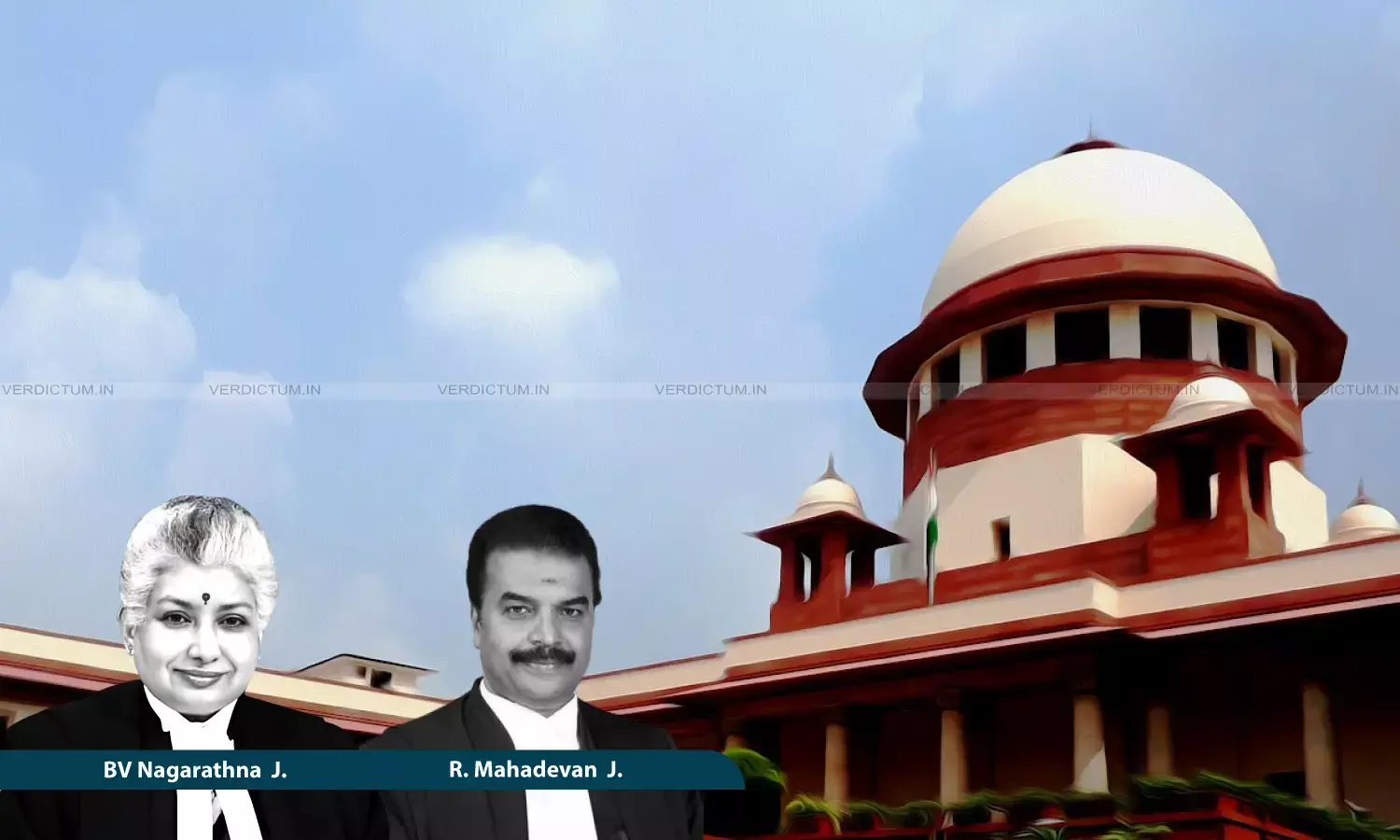Mere General Allegations Of Harassment Without Pointing Out Specific Details Not Sufficient For Attracting Offence U/S. 498A IPC: Supreme Court
The appeal before the Supreme Court arose from an order of the Allahabad High Court refusing to quash the proceedings initiated at the instance of the woman against her husband & in-laws.

Justice B.V. Nagarathna, Justice R. Mahadevan, Supreme Court
The Supreme Court has quashed a dowry harassment case agaisnt a brother-in-law of a woman and observed that mere general allegations of harassment without pointing out the specific details would not be sufficient to continue criminal proceedings against any person under section 498A of the IPC.
The appeal before the Apex Court arose from an order of the Allahabad High Court refusing to quash the proceedings arising out of an FIR filed by the complainant/second respondent, against her husband, mother-in-law and brother-in-law under Sections 323 and 498A of the Indian Penal Code, 1860 and Sections 3 and 4 of the Dowry Prohibition Act, 1961.
The Division Bench of Justice B.V. Nagarathna and Justice R. Mahadevan held, “Furthermore, merely stating that the accused/appellant has mentally harassed the complainant/respondent No.2 with respect to a demand for dowry does not fulfill the ingredients of Section 498A of IPC specially in absence of any cogent material or evidence on record to substantiate the said allegations. The term “cruelty” cannot be established without specific instances.”
“Therefore, mere general allegations of harassment without pointing out the specific details would not be sufficient to continue criminal proceedings against any person”, it added.
Advocate Saurabh Soni represented the Appellant, while AOR Vijendra Singh represented the Respondent.
Factual Background
The complainant married the brother of the accused/appellant in 2014, and after a few months into the marriage, on account of marital discord, she left her matrimonial home and started residing at her parental home. Thereafter, both parties initiated multiple matrimonial proceedings against each other. It was alleged that due to repeated harassment related to dowry, a vein of the complainant’s brain burst and consequently her right hand and right leg got paralyzed due to which she had to undertake physiotherapy. Aggrieved by the registration of the FIR, the accused appellant, along with the mother-in-law and husband of the complainant, filed a Writ Petition seeking quashing of the same.
The Allahabad High Court, vide the impugned order refused to quash the proceedings and observed that although the prayer made in the said Writ Petition was to quash the FIR, the accused/appellant sought the relief of grant of protection under Section 41A of the Code of Criminal Procedure, 1973 (CrPC) only. It was further held that a prima facie case of commission of a cognizable offence was made out. Aggrieved thereby, the appellant approached the Apex Court.
Reasoning
On a perusal of the FIR, the Bench noted that the allegations made by the complainant were vague and omnibus. Other than claiming that the husband and his family, along with the accused/appellant mentally harassed her with a demand for dowry, the complainant did not provide any specific details or describe any particular instance of harassment. She also did not mention the time, date, place, or manner in which the alleged harassment occurred or the details of the nature of demand or its particulars.
“Therefore, the FIR lacks concrete and precise allegations. Furthermore, the complainant/respondent No.2 has failed to impress the Court as to how the alleged harassment has any proximate relationship to the said injury and nerve damage that she sustained, so as to punish her in-laws under Section 323 IPC. There is no remote or proximate act or omission attributed to the accused/appellant that implicates him or assigns him any specific role in the said FIR for the offence of hurt as defined under Section 319 IPC”, it added.
The Bench noted the missing specifics in the FIR, which was the basic premise for invoking the criminal machinery of the State and further noted that in such cases involving allegations of cruelty and harassment, there would normally be a series of offending acts, which would be required to be spelt out by the complainant against perpetrators in specific terms to initiate criminal proceedings against them. The Bench also mentioned, “Courts have to be careful and cautious in dealing with complaints and must take pragmatic realities into consideration while dealing with matrimonial disputes where the allegations have Page 10 of 14 to be scrutinized with great care and circumspection in order to prevent miscarriage of justice and abuse of process of law.”
Considering that none of the offences alleged against the accused/ appellant herein was made out, the Bench stated that the allegations of cruelty, mental harassment, and voluntarily causing hurt against the accused/appellant were vague and general in nature. Applying the precedent in State of Haryana vs. Bhajan Lal (1992) it said, “It is neither expedient nor in the interest of justice to permit the present prosecution emanating from the FIR to continue.”
Thus, allowing the appeal, the Bench set aside the impugned order and quashed the FIR as well as all consequent proceedings initiated pursuant thereto only qua the accused/appellant.
Cause Title: A v. State Of Uttar Pradesh (Neutral Citation: 2025 INSC 1152)
Appearance
Appellant: Advocates Saurabh Soni, Maneesh Saxena, AOR Anupam Singh, Advocate Mannat Singh
Respondent: AOR Vijendra Singh, Advocates Vikas Bansal, Apurva Singh, AOR Devesh Kumar Mishra, Advocate Vasasntha Kumar

